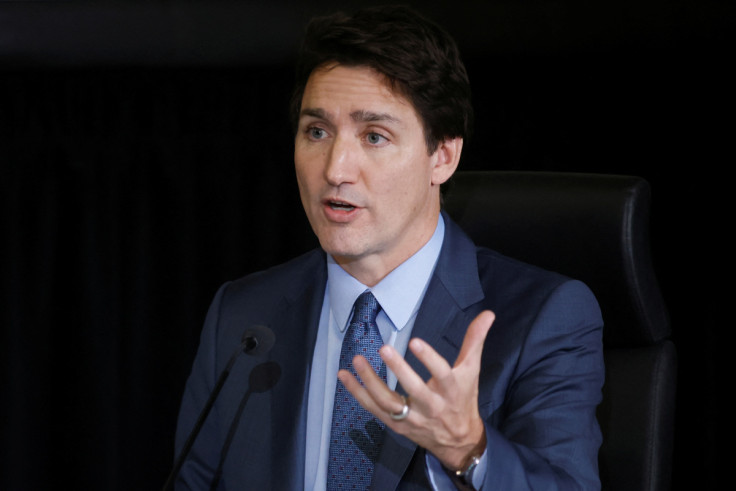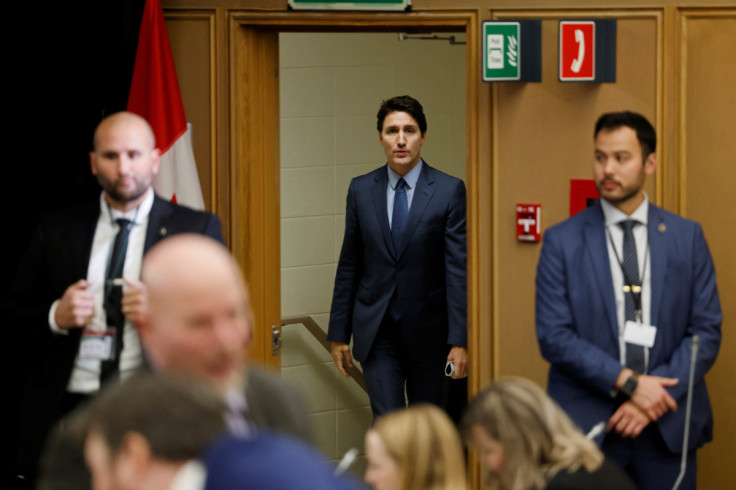Canada's Trudeau Defends Use Of Emergency Powers In 'Freedom Convoy' Protests

Canadian Prime Minister Justin Trudeau on Friday defended invoking emergency powers to end anti-government protests that paralyzed the capital earlier this year, citing the threat of violence and lack of a credible plan by police.
The "Freedom Convoy" demonstrations against public health measures including vaccine mandates shut down Ottawa and blocked some border crossings for weeks in January and February. Trudeau portrayed the move to use emergency powers as unavoidable, saying it was not possible to negotiate with the protesters.
"It wasn't that they just wanted to be heard. They wanted to be obeyed," Trudeau told the independent public commission looking into the government's use of the powers.
"I am absolutely, absolutely serene and confident that I made the right choice in agreeing with the invocation."
It was a rare appearance by a sitting prime minister at a public inquiry meant to shed light on the process that handed authorities extraordinary powers and determine whether decisions were made transparently with clear accountability.
The final report is due to be presented in Canada's parliament by Feb. 20.
Trudeau cited the threat of serious violence and local police not having a credible plan to restore order as reasons that prompted him to invoke the Emergencies Act, which has not been used in its current form since it was created in the 1980s.
Civil liberties advocates argued police could have cleared the blockades using existing powers. Lawyers for the convoy organizers and others said Trudeau had not read a plan prepared by Ottawa Police and pointed to one border blockade being cleared and criminal charges laid at another without the use of emergency powers.
Trudeau acknowledged that "not all tools had been used" by police and said that was the problem. He said he would not have invoked emergency powers if anyone had convinced him the situation could have been resolved without them.
"We kept hearing there was a plan.... (but it) was not even in the most generous of characterizations a plan," Trudeau said.
The act gave the government temporary powers, including the ability to impose restrictions on public assembly and to mobilize federal support for local and provincial police.
It allowed financial institutions to temporarily freeze the bank accounts of people believed to be supporting the convoy and allowed the government to order towing services to clear blockades.
'DANGEROUS MOMENT'
Earlier this week, Canadian Finance Minister Chrystia Freeland said Canada had faced "a dangerous moment" amid the protests, which shut down a vital trade corridor between the United States and Canada.
Trudeau also said he had tried to reassure U.S. President Joe Biden at the time that Canada was "going to continue to be a reliable partner" amid disruptions caused by border blockades.
A lawyer for convoy organizers said the Emergencies Act could have been avoided had a "de-escalation agreement" with protesters been followed. She asked Trudeau: "When did you and your government start to become so afraid of your own citizens?"
"I am not and we are not," Trudeau replied.
The impact of the protests reverberated in Canada and abroad long after the border blockades and Ottawa protests were cleared in February, with copycat protests featuring trailers and trucks following in the United States and France.
(Editing by Deepa Babington)

© Copyright Thomson Reuters 2024. All rights reserved.





















